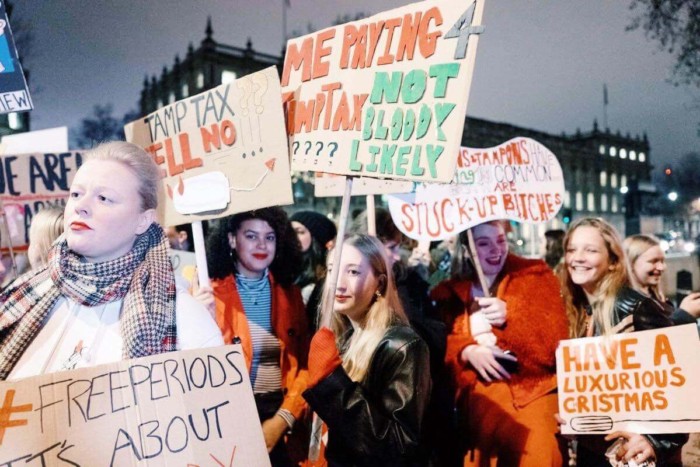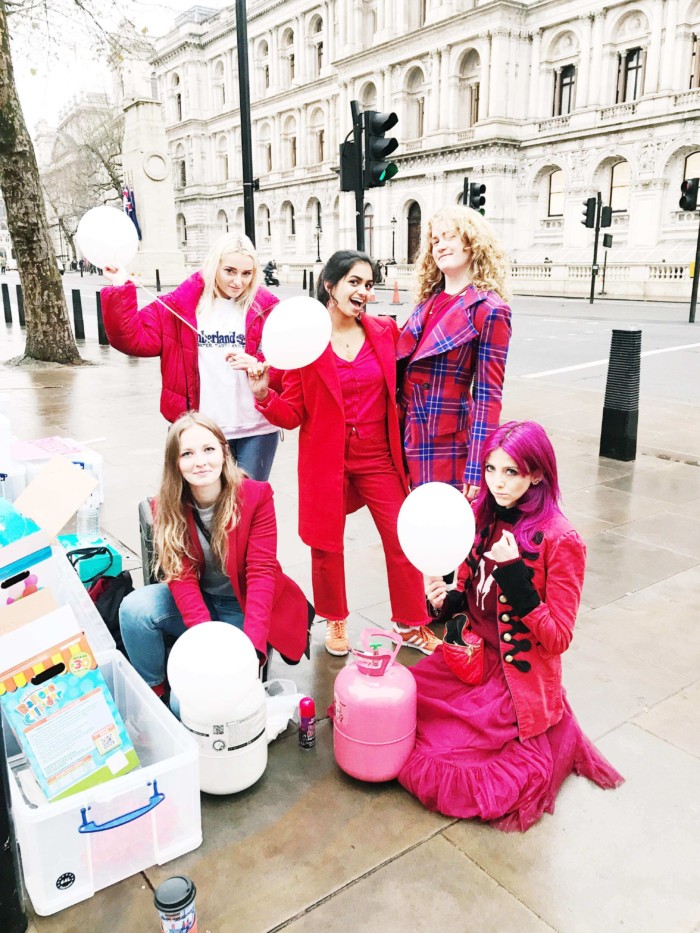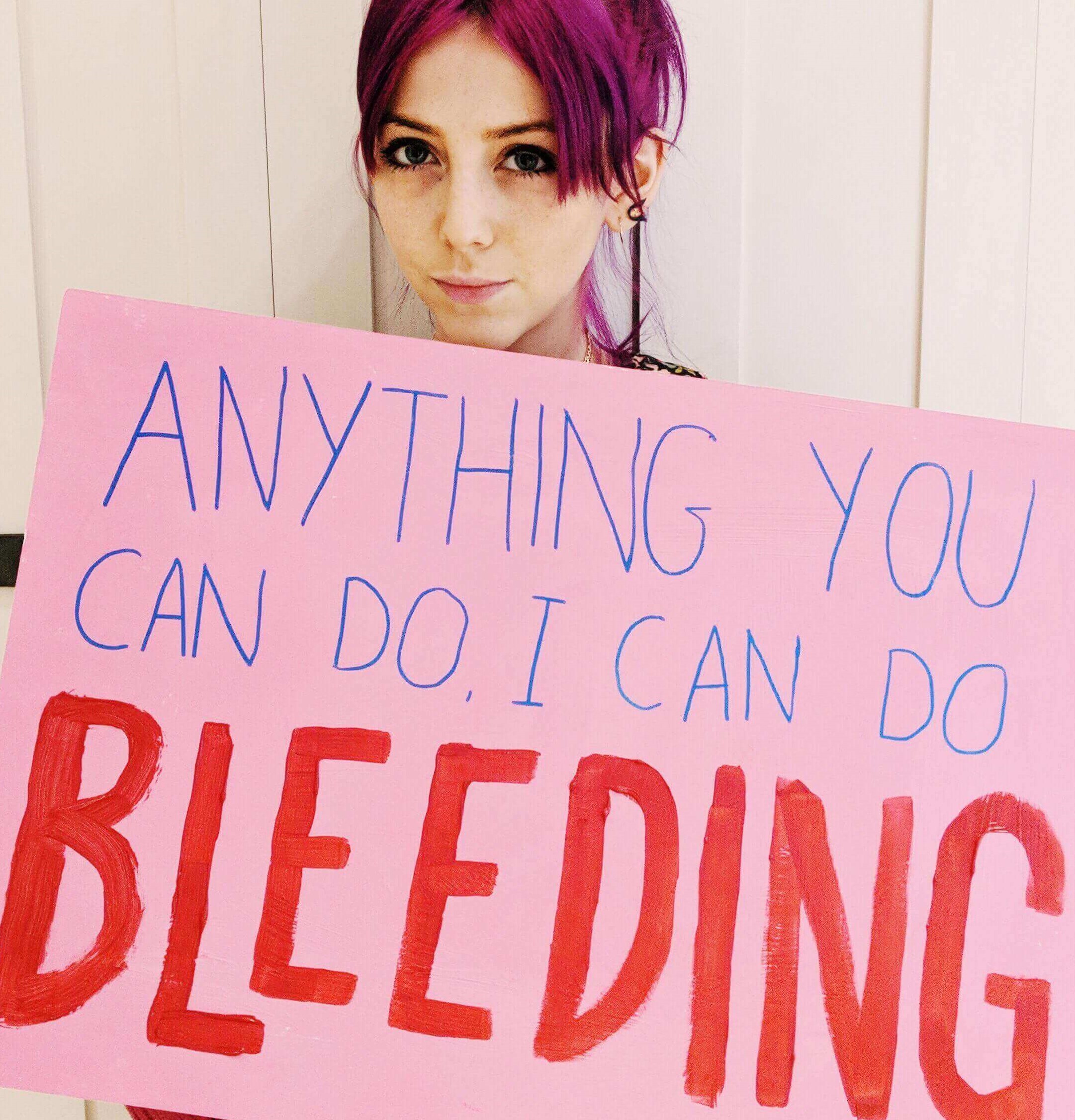Scarlett Curtis: “1 in 10 British girls can’t afford menstrual products”
In December 2017, I went to the #FreePeriods protest organised in London. It was an inspiring event, filled with young people and lot of hope. Following this protest I got in touch with young activist Scarlett Curtis, who helped organise the event, to discuss the importance of the movement, being a young activist, and how people can get involved and fight for equality in the face of overwhelming problems.
Curtis described The Pink Protest as “a community of activists committed to engaging in action and supporting each other”. What comes across very strongly is a refreshing attitude that boils down to girls supporting girls. The movement is the result of young initiative, and offers support and a platform to young activists trying to make a change.
1 in 10 British girls can’t afford menstrual products
“Our first major campaign was #FREEPERIODS. We worked with Amika George to build out a campaign to call on the British government to address the 1 in 10 British girls who can’t afford menstrual products and put an end to British period poverty once and for all,” Curtis tells me. What began as one girl’s outrage, became a change.org petition with almost 150,000 signatures, and eventually coalesced into a movement that brought hundreds of people to the steps of Westminster. The Pink Protest is certainly a product of the modern feminist movement “utilising social media as well as IRL spaces to make change happen”.

Image: Scarlett Curtis
Curtis talked about how this protest is “an amazing way for the public to show our government this is not an issue that can be ignored but there’s still a lot of work to be done”. Not only is the #freeperiods movement one that addresses the unspoken difficulties endured by a large sector of society, but it is an important one for de-stigmatising the female body and addressing our internalised misogyny as a society. “So much of the reason that period poverty is such an issue is because of the inbuilt shame and stigma we still have as women around our periods. The patriarchy has constructed a world where we don’t actually complain about women’s pain because we are ashamed of it and taught to just suck it up.” At the heart of this is legitimising and taking seriously pain that is unique to women. “I hate to think the progress that would have been made on issues like endometriosis or period poverty if women weren’t trained to never talk about these things and suffer in silence,” says Curtis.
Writing to your MP seems old fashioned but it works
The movement has gained a lot of attention from activists and politicians alike, and Curtis tells me that they are currently “formulating a plan with Paula Sherriff [Labour MP for Dewbury] and Jess Phillips [Labour MP for Birmingham Yardley]”. It was certainly refreshing to hear many of the speakers at the protest in December say words like “vagina”, “blood” and “period” in front of hundreds of people. It is a fact that women and girls get periods, and that this stands in the way of education for some of these girls. It is therefore inspiring to hear elected politicians take this seriously.
Curtis tells me, that the best thing people can do to help the movement “is to write to your MP and tell them you’d like to see the issue of Period Poverty in British schools addressed before the end of 2018. Writing to your MP seems old fashioned but it WORKS.”
How do we move from simply spreading awareness to activism that has tangible effects?
Curtis describes her activism as “really focused around results and not just awareness”. What is most important to her is “making sure that we aren’t just talking about issues and then thinking the work is done.” Certainly, reposting articles and sharing hashtags are part of it “but [awareness is] only the first step and I’m really keen on charities and individuals that are exploring what comes after that.”
What that looks like exactly is the golden question. How do we move from simply spreading awareness to activism that has tangible effects? “I think sometimes we can all feel a pressure to start something or do something new but the reality is that our world is FILLED with incredible men and women who work as activists full time and need all the support they can get”. The answer then seems to be: find something you care passionately about and research organisations and movements you can devote your time to. “Every non-profit has an ‘action’ page on their website and sometimes the actions are as simple as signing an online petition or donating a few pounds. We do a lot to highlight different organisations on our @pinkprotest Instagram and we have a weekly series called ‘On Wednesday’s We Wear Pink and Protest’ where we give one easy, online action per week that you can take to start getting involved”.

Image: Scarlett Curtis
For inspiration for some great organisations to get behind, Curtis gave me a list of some of her favourites: Help Refugees (“Josie Naughton is my personal hero”); Elyse Fox and the Sad Girls Club, which brings together girls suffering from mental illness; The Pants Project which sells knickers to raise money and awareness about infertility; Gurls Talk which is a platform for girls to share their experiences, and many others.
Get involved in the fight against period poverty on campus
Our very own Students’ Union (SU) is part of the movement to combat period poverty. On an online page entitled “free periods”, it vouches to provide “a limited amount of menstrual care products to those in need”. There is a form to fill out if you are personally affected by period poverty and cannot afford menstrual products.
Additionally, on the Women’s Officer blog page, there is an article entitled “period and pregnancy provisions at Warwick SU”, written by former women’s officer Emma-Marie Okoroafor. There, you can read about Warwick’s history of period activism as well as information about how to get “emergency menstrual care provisions” in the SU if you can’t afford it, or you’ve simply come to campus and left those essential products at home.

Image: Scarlett Curtis
If you want to get involved in the fight against period poverty on campus, check out Warwick Anti-Sexism Society and Warwick Labour, which work to raise money and provisions for Haven, a women’s shelter in Coventry. Their work has included collections of sanitary products.
The battle towards ending period poverty has already begun on our own campus.

Comments